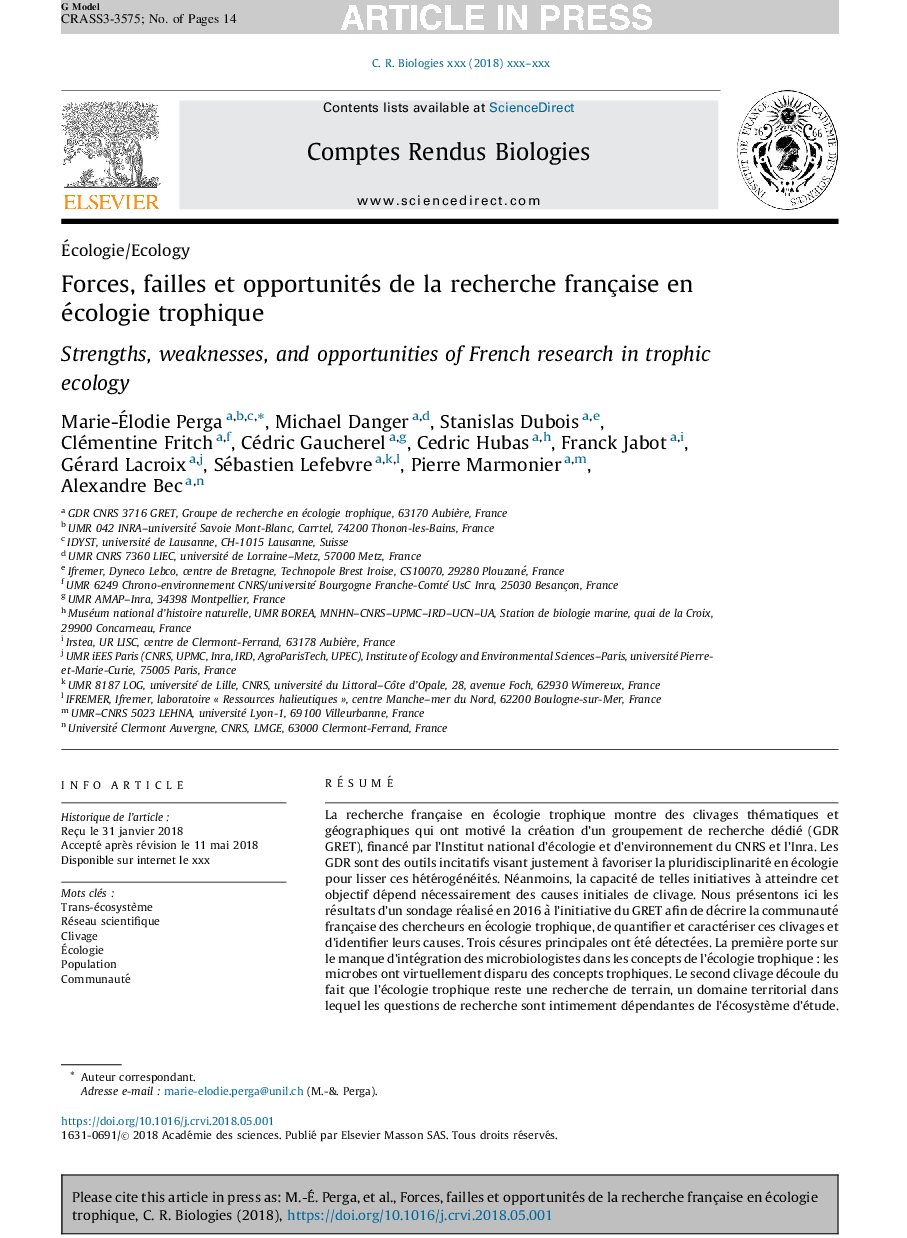| کد مقاله | کد نشریه | سال انتشار | مقاله انگلیسی | نسخه تمام متن |
|---|---|---|---|---|
| 8625316 | 1568195 | 2018 | 14 صفحه PDF | دانلود رایگان |
عنوان انگلیسی مقاله ISI
Forces, failles et opportunités de la recherche française en écologie trophique
دانلود مقاله + سفارش ترجمه
دانلود مقاله ISI انگلیسی
رایگان برای ایرانیان
کلمات کلیدی
موضوعات مرتبط
علوم زیستی و بیوفناوری
علوم کشاورزی و بیولوژیک
علوم کشاورزی و بیولوژیک (عمومی)
پیش نمایش صفحه اول مقاله

چکیده انگلیسی
The French National Institute of Ecology and Environment (INEE) aims at fostering pluridisciplinarity in Environmental Science and, for that purpose, funds ex muros research groups (GDR) on thematic topics. Trophic ecology has been identified as a scientific field in ecology that would greatly benefit from such networking activity, as being profoundly scattered. This has motivated the seeding of a GDR, entitled “GRET”. The contours of the GRET's action, and its ability to fill these gaps within trophic ecology at the French national scale, will depend on the causes of this relative scattering. This study relied on a nationally broadcasted poll aiming at characterizing the field of trophic ecology in France. Amongst all the unique individuals that fulfilled the poll, over 300 belonged at least partly to the field of trophic ecology. The sample included all French public research institutes and career stages. Three main disruptions within the community of scientist in trophic ecology were identified. The first highlighted the lack of interfaces between microbial and trophic ecology. The second evidenced that research questions were strongly linked to single study fields or ecosystem type. Last, research activities are still quite restricted to the ecosystem boundaries. All three rupture points limit the conceptual and applied progression in the field of trophic ecology. Here we show that most of the disruptions within French Trophic Ecology are culturally inherited, rather than motivated by scientific reasons or justified by socio-economic stakes. Comparison with the current literature confirms that these disruptions are not necessarily typical of the French research landscape, but instead echo the general weaknesses of the international research in ecology. Thereby, communication and networking actions within and toward the community of trophic ecologists, as planned within the GRET's objectives, should contribute to fill these gaps, by reintegrating microbes within trophic concepts and setting the seeds for trans- and meta-ecosystemic research opportunities. Once the community of trophic ecologists is aware of the scientific benefit in pushing its boundaries forwards, turning words and good intentions into concrete research projects will depend on the opportunities to obtain research funding.
ناشر
Database: Elsevier - ScienceDirect (ساینس دایرکت)
Journal: Comptes Rendus Biologies - Volume 341, Issue 6, JulyâAugust 2018, Pages 301-314
Journal: Comptes Rendus Biologies - Volume 341, Issue 6, JulyâAugust 2018, Pages 301-314
نویسندگان
Marie-Ãlodie Perga, Michael Danger, Stanislas Dubois, Clémentine Fritch, Cédric Gaucherel, Cedric Hubas, Franck Jabot, Gérard Lacroix, Sébastien Lefebvre, Pierre Marmonier, Alexandre Bec,